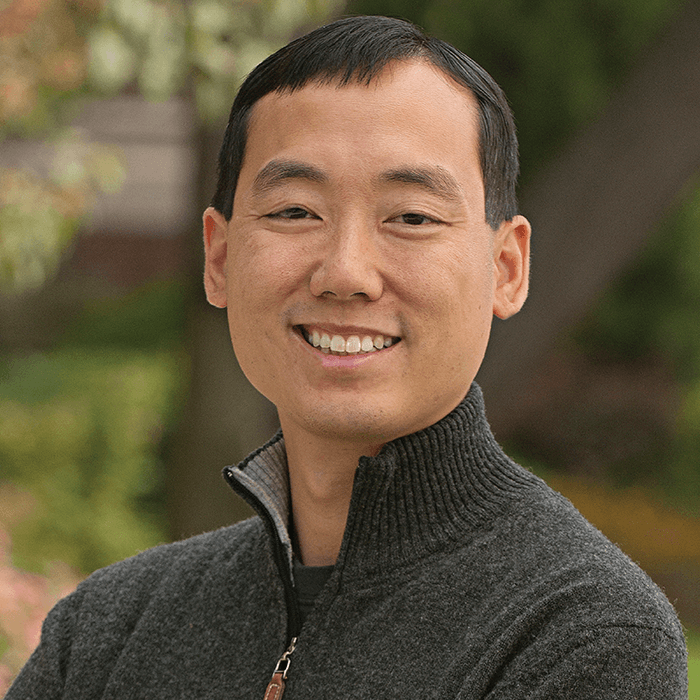
Can you talk a little about your career journey?
I grew up in Springfield – the capital of Illinois and hometown of Abraham Lincoln. As a kid, I loved reading about history. I studied history at Yale as an undergraduate, but decided to go to medical school because I wanted a career in which I could directly help people. At the University of Pennsylvania, I quickly decided I wanted to choose a surgical subspecialty. I have always been fascinated by vision and the eye – and the ophthalmologists I met seemed happy and fulfilled. After enjoying an ophthalmology elective in my third year of medical school, my mind was made up.
I completed my residency and retina fellowship at Wills Eye Hospital in Philadelphia. I subsequently joined New England Retina Consultants in Massachusetts, where I am now the senior partner. I am also an assistant professor at the University of Massachusetts Medical School.
How did you branch out into writing?
The idea of being a writer occurred to me during residency. I thought, “Isn’t it a pity that I can’t share all that I learned in college about World War II in China with other people?” I had focused on this topic at Yale and felt that it was an unmined aspect of the war that most people did not know about. I was in a busy residency, with kids, and did not have the time necessary to write a non-fiction book. And then I thought, “What if I wrote a novel?” So, I wrote my first book, Two Sons of China, in my spare time over the course of many years. I got an agent and a book deal. That novel came out in 2014 and was a Foreword Reviews Book of the Year.
After that I wrote Saving Sight, an Amazon bestseller that was a memoir of my surgical training blended with the stories of ophthalmology’s greatest heroes (such as Sir Harold Ridley, Charles Kelman, Arnall Patz, and Charles Schepens). These individuals overcame ridicule, setbacks, and innumerable challenges to invent the techniques we use to save sight today. Their stories have touched many readers and I still get emails from people all over the world who tell me the book inspired them to go into ophthalmology, which is very gratifying.
I wrote another novel of WWII called Repentance that highlighted the heroism of Japanese Americans. And my newest book, The Masters of Medicine, covers the greatest medical breakthroughs in modern times.
Which mentors have most influenced your ophthalmology career?
In residency and fellowship at Wills Eye Hospital, I had many wonderful teachers and role models. Everyone looked up to William Tasman and William Benson – luminaries who made significant contributions to ophthalmology throughout their careers. And they both shared my love of history. Though they could have rested on their laurels and devoted their time to enjoying retirement, they both clearly enjoyed teaching and spending time with young doctors.
My co-residents and I benefited greatly from the expertise of two top cataract surgeons, Robert Bailey and Mark Blecher. I still remember their patience and assistance as they calmly steered me away from trouble in the operating room and encouraged me as a young surgeon.
I also appreciated the humanism of George Spaeth (glaucoma), the commitment of doctors like Jurij Bilyk (oculoplastics) and Chris Rapuano (cornea), and the expertise of Ralph Eagle (ocular pathology).
I did research and wrote papers with mentors Carl Regillo, Allen Ho, and Carol Shields – all of whom were very kind and served as great role models. Finally, I was fond of two attendings, Joseph Maguire and Arch McNamara, who are no longer with us but were beloved for their talent, kindness, and good humor.
What are some of the biggest ophthalmology breakthroughs in the last ten years?
There have been several important advances in surgery and medications, including corneal cross-linking for keratoconus, MIGs for glaucoma, Tapezza for thyroid eye disease, improved multifocal IOLs, the femtosecond laser, which has made cataract surgery even safer, progress with the light adjustable lens, low-dose atropine for myopia, and OCT-angiography. Another important advance has been new treatments for geographic atrophy in dry AMD, a condition for which there was no prior treatment.
But perhaps the closest thing to a true breakthrough was Luxturna – the first approved gene therapy in the US and Europe, for retinitis pigmentosa and Lebers congenital amaurosis (caused by mutations in RPE65 gene). This therapy will hopefully be the vanguard of future gene therapies for other inherited retinal diseases; Jean Bennett and Albert Maguire have earned a place in any future book on the history of our field. I met them while in medical school at the University of Pennsylvania and still remember their early presentations on their successful treatment in a dog named Lancelot about 20 years ago…
What do you enjoy doing outside of work?
My wife and I have four kids and raising them has been a fulfilling adventure. For years, my chief function outside of work seemed to be chauffeuring them to their various activities. I love to travel and have a goal of visiting every National Park site in the US. I’m also quite involved in civic activities, have held several positions in municipal government, and am a trustee of a local university.
What future breakthroughs would you like to see in ophthalmology?
I’m hopeful that we will see additional gene therapies for inherited retinal diseases in the next decade. I hope for more effective treatments for geographic atrophy in dry macular degeneration, including possible stem cell therapies. I’m confident AI will prove beneficial for screening of diabetic retinopathy, glaucoma, and macular degeneration. Home OCT monitoring using AI may be beneficial – if it can be done inexpensively. We all share hope for improved accommodating IOLs. And in surgery someday, surgeons may use heads-up displays or visors. In-office vitrectomy for vitreous hemorrhage and floaters may also be realistic future advances.
